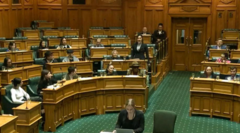In a significant parliamentary vote, the Treaty Principles Bill was defeated 112 to 11 as public outrage led to widespread protests. The bill's failure marks a united front against its perceived threat to Māori rights and social harmony.
New Zealand's Treaty Principles Bill Fails Following Major Public Backlash

New Zealand's Treaty Principles Bill Fails Following Major Public Backlash
The controversial legislation aimed at redefining New Zealand's foundational Treaty principles has been decisively rejected in parliament.
A highly contentious bill which sought to redefine the principles derived from New Zealand's foundational document, the Treaty of Waitangi, has been overwhelmingly rejected during its second reading in parliament. The Treaty Principles Bill, which aimed to legally articulate the Treaty principles, faced notable resistance, concluding with a vote of 112 against 11. This move came just days after a government committee advocated against the bill's progression, citing substantial public dissent that culminated in protests attended by over 40,000 demonstrators.
Originally anticipated to meet resistance, the bill was solely supported by members of the right-wing Act Party, with their leader, David Seymour, vowing to persist in advocacy for similar legislation. He expressed belief through social media that the bill's ideals would eventually be legislated, as he found the arguments against it inadequate.
Parliamentary proceedings became heated during the associated debates; Labour MP Willie Jackson was asked to withdraw a statement directed at Seymour. Labour leader Chris Hipkins criticized the bill, asserting it would leave a lasting negative imprint on the country, while Te Pāti Māori MP Hana Rāwhiti Maipi-Clarke, who had gained notoriety for initiating a haka in parliament during its first reading, declared that the proposed legislation had been decisively "annihilated." Reflecting on the situation, Green Party co-leader Marama Davidson remarked on the unifying force of the movement against the bill, attributing the solidarity to the desire to honor and uphold their founding agreement.
The bill was scrutinized by a select committee that revealed more than 300,000 submissions had been filed, marking the largest response in the New Zealand parliament's history. Most submissions expressed opposition to the bill. Advocates for the legislation proposed three foundational tenets: acknowledging government authority, honoring Māori rights from the Treaty, and ensuring equality before the law.
Despite the rejection, Act Party enthusiasts, including former National Party finance minister Ruth Richardson, urged that this "bill of consequence" needed attention, arguing for an official acknowledgment of the Treaty principles through parliamentary definitions. She criticized the notion that such principles currently rely on judicial interpretation rather than legislative clarity.
Critics voiced concerns that the bill could jeopardize Māori rights and increase societal divides, with Sharon Hawke, daughter of late Māori activist Joe Hawke, stating the legislation undermined decades of progress toward education and health for Māori communities. Notably, public submissions highlighted conflicts with Treaty principles and potential breaches of international law.
The initial reading in November saw backing from the ruling coalition's dominant party, the National Party, yet Prime Minister Christopher Luxon indicated a lack of support ahead of the second reading and suggested it was preferable to move beyond the discussion surrounding the bill.




















